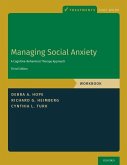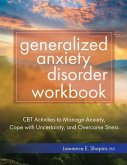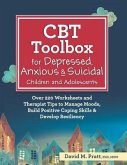Debra A Hope, Richard G Heimberg, Cynthia L Turk
Managing Social Anxiety, Therapist Guide
A Cognitive-Behavioral Therapy Approach
Debra A Hope, Richard G Heimberg, Cynthia L Turk
Managing Social Anxiety, Therapist Guide
A Cognitive-Behavioral Therapy Approach
- Broschiertes Buch
- Merkliste
- Auf die Merkliste
- Bewerten Bewerten
- Teilen
- Produkt teilen
- Produkterinnerung
- Produkterinnerung
The third edition of Managing Social Anxiety: A Cognitive-Behavioral Therapy Approach, Therapist Guide is for individual or group cognitive-behavioral therapy for social anxiety with adults. This is an evidence-based approach backed by over three decades of research.
Andere Kunden interessierten sich auch für
![Managing Social Anxiety, Workbook Managing Social Anxiety, Workbook]() Debra A HopeManaging Social Anxiety, Workbook68,99 €
Debra A HopeManaging Social Anxiety, Workbook68,99 €![Managing Your Substance Use Disorder Managing Your Substance Use Disorder]() Dennis C DaleyManaging Your Substance Use Disorder69,99 €
Dennis C DaleyManaging Your Substance Use Disorder69,99 €![Managing Substance Use Disorder Managing Substance Use Disorder]() DaleyManaging Substance Use Disorder86,99 €
DaleyManaging Substance Use Disorder86,99 €![Generalized Anxiety Disorder Workbook: CBT Activities to Manage Anxiety, Cope with Uncertainty, and Overcome Stress Generalized Anxiety Disorder Workbook: CBT Activities to Manage Anxiety, Cope with Uncertainty, and Overcome Stress]() Lawrence ShapiroGeneralized Anxiety Disorder Workbook: CBT Activities to Manage Anxiety, Cope with Uncertainty, and Overcome Stress24,99 €
Lawrence ShapiroGeneralized Anxiety Disorder Workbook: CBT Activities to Manage Anxiety, Cope with Uncertainty, and Overcome Stress24,99 €![CBT Toolbox for Depressed, Anxious & Suicidal Children and Adolescents: Over 220 Worksheets and Therapist Tips to Manage Moods, Build Positive Coping CBT Toolbox for Depressed, Anxious & Suicidal Children and Adolescents: Over 220 Worksheets and Therapist Tips to Manage Moods, Build Positive Coping]() David PrattCBT Toolbox for Depressed, Anxious & Suicidal Children and Adolescents: Over 220 Worksheets and Therapist Tips to Manage Moods, Build Positive Coping42,99 €
David PrattCBT Toolbox for Depressed, Anxious & Suicidal Children and Adolescents: Over 220 Worksheets and Therapist Tips to Manage Moods, Build Positive Coping42,99 €![Healing Anxiety, Depression and Unworthiness Healing Anxiety, Depression and Unworthiness]() Mary NurriestearnsHealing Anxiety, Depression and Unworthiness22,99 €
Mary NurriestearnsHealing Anxiety, Depression and Unworthiness22,99 €![Regulate, Reason, Reassure: A Parent's Guide to Understanding and Managing Misophonia Regulate, Reason, Reassure: A Parent's Guide to Understanding and Managing Misophonia]() Jennifer Jo BroutRegulate, Reason, Reassure: A Parent's Guide to Understanding and Managing Misophonia18,99 €
Jennifer Jo BroutRegulate, Reason, Reassure: A Parent's Guide to Understanding and Managing Misophonia18,99 €-
-
-
The third edition of Managing Social Anxiety: A Cognitive-Behavioral Therapy Approach, Therapist Guide is for individual or group cognitive-behavioral therapy for social anxiety with adults. This is an evidence-based approach backed by over three decades of research.
Hinweis: Dieser Artikel kann nur an eine deutsche Lieferadresse ausgeliefert werden.
Hinweis: Dieser Artikel kann nur an eine deutsche Lieferadresse ausgeliefert werden.
Produktdetails
- Produktdetails
- Verlag: Hurst & Co.
- 3rd edition
- Seitenzahl: 224
- Erscheinungstermin: 20. November 2019
- Englisch
- Abmessung: 256mm x 180mm x 15mm
- Gewicht: 427g
- ISBN-13: 9780190247591
- ISBN-10: 0190247592
- Artikelnr.: 56742708
- Herstellerkennzeichnung
- Libri GmbH
- Europaallee 1
- 36244 Bad Hersfeld
- gpsr@libri.de
- Verlag: Hurst & Co.
- 3rd edition
- Seitenzahl: 224
- Erscheinungstermin: 20. November 2019
- Englisch
- Abmessung: 256mm x 180mm x 15mm
- Gewicht: 427g
- ISBN-13: 9780190247591
- ISBN-10: 0190247592
- Artikelnr.: 56742708
- Herstellerkennzeichnung
- Libri GmbH
- Europaallee 1
- 36244 Bad Hersfeld
- gpsr@libri.de
Debra A. Hope is a professor in the Department of Psychology at the University of Nebraska-Lincoln. She has published over 110 books and papers on topics related to social anxiety, cognitive-behavioral treatment, dissemination of evidence-based treatments and the mental health impacts of stigma on gender and sexual minorities. Professor Hope is Past President of the Association of Behavioral and Cognitive Therapies and past Associate Editor of Clinical Psychology: Science and Practice and Cognitive Therapy and Research. Richard G. Heimberg is the Thaddeus L. Bolton Professor of Psychology at Temple University, where he also directs the Adult Anxiety Clinic. He is well known for his efforts to develop and evaluate models and treatments for social anxiety disorder. He has published 12 books and more than 450 papers on social anxiety, CBT, and related topics, and was recently listed among the top 1% of cited authors in his field according to Thomson Reuters. Dr. Heimberg is Past President of the Association for Behavioral and Cognitive Therapies and of the Society for a Science of Clinical Psychology, and Past Editor of Behavior Therapy. Cynthia L. Turk is a professor in the Psychology Department at Washburn University, where she serves as the department chairperson. She is Past President of the Southwestern Psychological Association. She has over 60 professional publications and over 100 professional presentations, primarily in the areas of social anxiety disorder and generalized anxiety disorder. She teaches graduate courses in psychopathology and psychotherapy techniques and supervises master's students in the Washburn University Psychological Services Clinic where she directs the Anxiety Clinic. Dr. Turk is a licensed psychologist.
* Introduction
* Chapter 1
* Psychoeducation: Background on Social Anxiety and its Treatment
* Chapter 2
* Psychoeducation: Understanding the Nature of Social Anxiety and How
to Manage It
* Chapter 3
* Psychoeducation: Etiology of Social Anxiety and Beginning to Monitor
Progress
* Chapter 4
* The Fear and Avoidance Hierarchy
* Chapter 5
* Cognitive Restructuring: Learning about Cognitive Biases and
Identifying Automatic Thoughts
* Chapter 6
* Cognitive Restructuring: Challenging Automatic Thoughts
* Chapter 7
* Exposure and Cognitive Restructuring: First Exposure
* Chapter 8
* Exposure and Cognitive Restructuring: Ongoing Exposure
* Chapter 9
* Additional Tools for Challenging Your Automatic Thoughts
* Chapter 10
* Exposure and Cognitive Restructuring: Conversation Fears
* Chapter 11
* Exposure and Cognitive Restructuring: Public Speaking Fears
* Chapter 12
* Advanced Cognitive Restructuring
* Chapter 13
* Termination
* Appendix A
* Assessment of Social Anxiety Disorder
* Appendix B
* Assessment Measures
* Chapter 1
* Psychoeducation: Background on Social Anxiety and its Treatment
* Chapter 2
* Psychoeducation: Understanding the Nature of Social Anxiety and How
to Manage It
* Chapter 3
* Psychoeducation: Etiology of Social Anxiety and Beginning to Monitor
Progress
* Chapter 4
* The Fear and Avoidance Hierarchy
* Chapter 5
* Cognitive Restructuring: Learning about Cognitive Biases and
Identifying Automatic Thoughts
* Chapter 6
* Cognitive Restructuring: Challenging Automatic Thoughts
* Chapter 7
* Exposure and Cognitive Restructuring: First Exposure
* Chapter 8
* Exposure and Cognitive Restructuring: Ongoing Exposure
* Chapter 9
* Additional Tools for Challenging Your Automatic Thoughts
* Chapter 10
* Exposure and Cognitive Restructuring: Conversation Fears
* Chapter 11
* Exposure and Cognitive Restructuring: Public Speaking Fears
* Chapter 12
* Advanced Cognitive Restructuring
* Chapter 13
* Termination
* Appendix A
* Assessment of Social Anxiety Disorder
* Appendix B
* Assessment Measures
* Introduction
* Chapter 1
* Psychoeducation: Background on Social Anxiety and its Treatment
* Chapter 2
* Psychoeducation: Understanding the Nature of Social Anxiety and How
to Manage It
* Chapter 3
* Psychoeducation: Etiology of Social Anxiety and Beginning to Monitor
Progress
* Chapter 4
* The Fear and Avoidance Hierarchy
* Chapter 5
* Cognitive Restructuring: Learning about Cognitive Biases and
Identifying Automatic Thoughts
* Chapter 6
* Cognitive Restructuring: Challenging Automatic Thoughts
* Chapter 7
* Exposure and Cognitive Restructuring: First Exposure
* Chapter 8
* Exposure and Cognitive Restructuring: Ongoing Exposure
* Chapter 9
* Additional Tools for Challenging Your Automatic Thoughts
* Chapter 10
* Exposure and Cognitive Restructuring: Conversation Fears
* Chapter 11
* Exposure and Cognitive Restructuring: Public Speaking Fears
* Chapter 12
* Advanced Cognitive Restructuring
* Chapter 13
* Termination
* Appendix A
* Assessment of Social Anxiety Disorder
* Appendix B
* Assessment Measures
* Chapter 1
* Psychoeducation: Background on Social Anxiety and its Treatment
* Chapter 2
* Psychoeducation: Understanding the Nature of Social Anxiety and How
to Manage It
* Chapter 3
* Psychoeducation: Etiology of Social Anxiety and Beginning to Monitor
Progress
* Chapter 4
* The Fear and Avoidance Hierarchy
* Chapter 5
* Cognitive Restructuring: Learning about Cognitive Biases and
Identifying Automatic Thoughts
* Chapter 6
* Cognitive Restructuring: Challenging Automatic Thoughts
* Chapter 7
* Exposure and Cognitive Restructuring: First Exposure
* Chapter 8
* Exposure and Cognitive Restructuring: Ongoing Exposure
* Chapter 9
* Additional Tools for Challenging Your Automatic Thoughts
* Chapter 10
* Exposure and Cognitive Restructuring: Conversation Fears
* Chapter 11
* Exposure and Cognitive Restructuring: Public Speaking Fears
* Chapter 12
* Advanced Cognitive Restructuring
* Chapter 13
* Termination
* Appendix A
* Assessment of Social Anxiety Disorder
* Appendix B
* Assessment Measures








